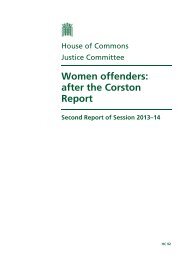Minority voices: Research into the access and acceptability of ... - MMC
Minority voices: Research into the access and acceptability of ... - MMC
Minority voices: Research into the access and acceptability of ... - MMC
- No tags were found...
Create successful ePaper yourself
Turn your PDF publications into a flip-book with our unique Google optimized e-Paper software.
! Awareness <strong>of</strong> mental health <strong>and</strong> mental health service provision/CAMHS“You can’t talk about your worries <strong>and</strong> ask someone for help unless you know <strong>the</strong>m. If I hadfriends, I might talk to <strong>the</strong>m but I don’t so I keep it to myself…” (Young refugee)This was a recurrent <strong>the</strong>me in <strong>the</strong> interviews <strong>and</strong> focus groups. Fears <strong>of</strong> stigma <strong>and</strong> generalreluctance to talk about <strong>the</strong>ir worries, unless it was with someone <strong>the</strong>y knew <strong>and</strong> trusted, werewidely held views. Mental health was also seen as madness or very serious illness, <strong>and</strong> assuch, not applicable to <strong>the</strong>m. O<strong>the</strong>rs indicated that <strong>the</strong>y would not talk about <strong>the</strong>ir difficultiesfor fear <strong>of</strong> being seen as silly or stupid - as one young person explained, talking to friends wasimpossible because:“They might laugh…I would laugh at my friends.” (Young refugee)A number <strong>of</strong> young people talked about considerable difficulties in finding out where to go once<strong>the</strong>y (or <strong>the</strong>ir families) had realised that <strong>the</strong>y had problems, with several saying that <strong>the</strong>y hadtried telephoning <strong>the</strong> emergency services (999). Some suggested that <strong>the</strong>y thought that GPsonly dealt with practical or physical problems or were for older people only. O<strong>the</strong>rs had similarbeliefs about Connexions, thinking this dealt with issues such as education <strong>and</strong> housing only.Apart from a lack <strong>of</strong> information about where to go <strong>and</strong> what to expect, quite a few <strong>of</strong> <strong>the</strong>young people we met had encountered problems in trying to get help. These included:• Long wait times for appointments.• Having to travel some distance to get to a service.• No interpreter <strong>and</strong> being told <strong>the</strong>y would have to return at a later date if <strong>the</strong>y requiredthis support.• Sense <strong>of</strong> being ‘passed around’ with no explanation as to why <strong>the</strong>y were being referredon.• Having to re-tell <strong>the</strong>ir story to different pr<strong>of</strong>essionals.• Services only being available at times that were not convenient for <strong>the</strong>m (clashes withcollege or school).For those who had received help from mental health services/CAMHS <strong>the</strong> following were noted:• A lack <strong>of</strong> information about what different CAMHS staff did, who <strong>the</strong>y would see <strong>and</strong>what would happen.• A lack <strong>of</strong> information about medication - especially what might happen when <strong>the</strong> dose isreduced or stopped.• A lack <strong>of</strong> support post discharge from a service - suggesting a need for much betterlinks <strong>and</strong> information about o<strong>the</strong>r services that young people can continue to getsupport from if <strong>the</strong>y feel <strong>the</strong>y still need this.“I was in hospital after taking an overdose <strong>and</strong> <strong>the</strong> hospital said I had to stay until I saw apsychiatrist. I didn’t know what a psychiatrist was or what <strong>the</strong>y would do, I thought <strong>the</strong>yworked with mad people, not me.” (Young person with experience <strong>of</strong> using CAMHS)! Confidentiality“It was daunting because I didn’t like to think anyone would see me going <strong>into</strong> <strong>the</strong> CAMHS,especially as it is very close to where I live. Didn’t want people to think I was mad or weird,it’s a stigma. Telling people in CAMHS about problems was difficult at first, <strong>the</strong>y may havethought I was mad or told o<strong>the</strong>r people…” (Young person with experience <strong>of</strong> using CAMHS)Many young people highlighted <strong>the</strong>ir concerns about <strong>the</strong> stigma <strong>of</strong> being in contact with mentalhealth services <strong>and</strong> services did not appear to have communicated <strong>the</strong>ir confidentiality policiesclearly. Young people were worried that friends <strong>and</strong> family would find out about <strong>the</strong>ir<strong>Minority</strong> Voices <strong>Research</strong> Report26
















